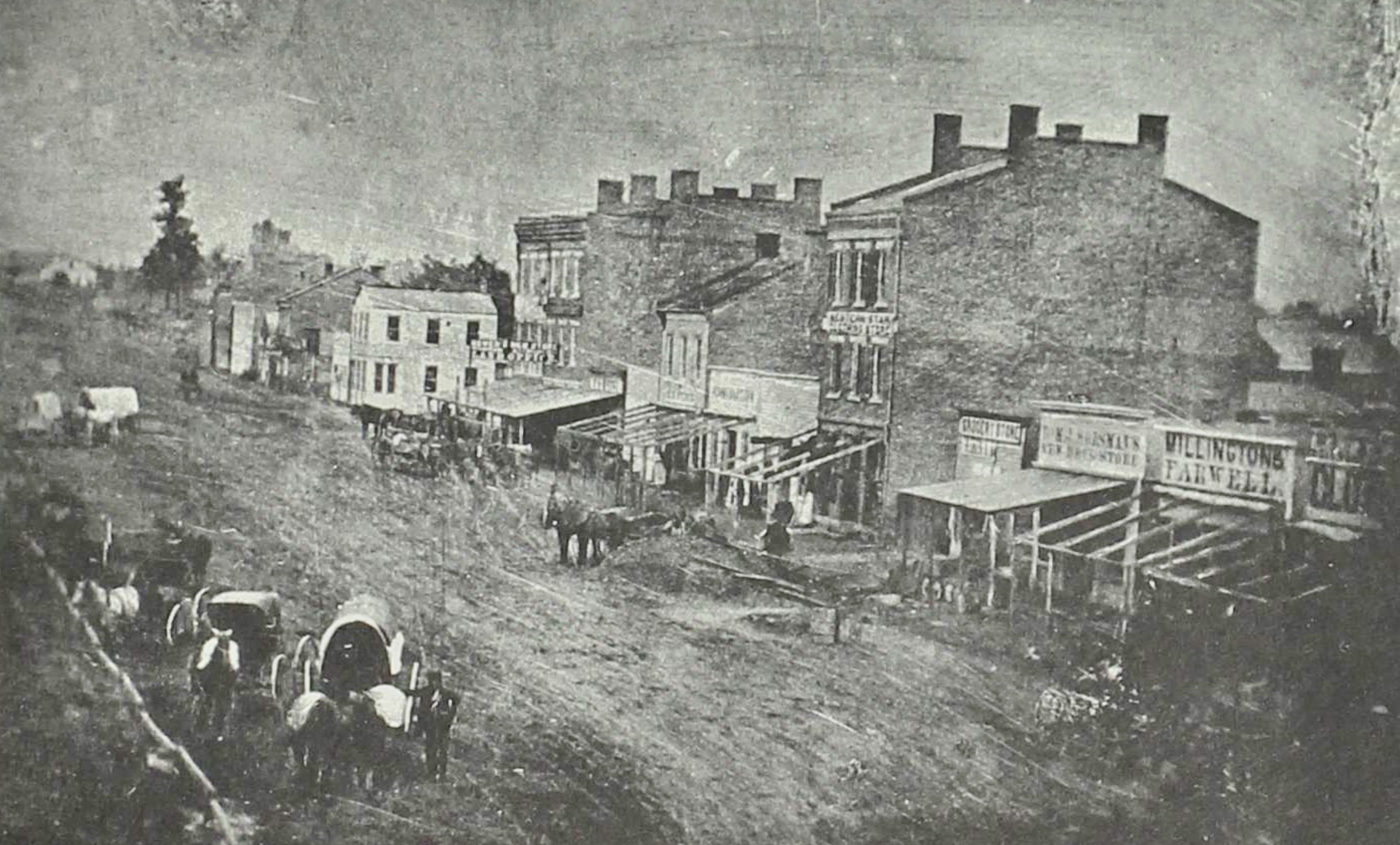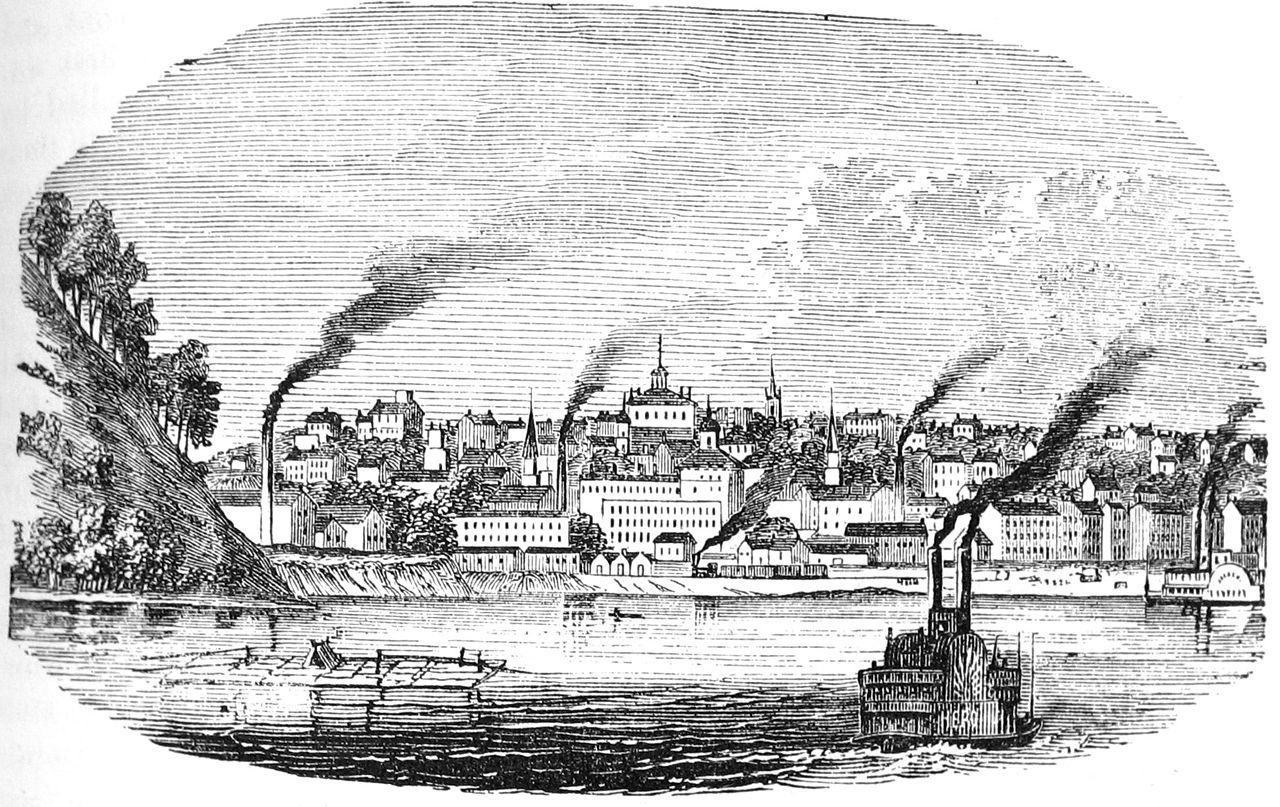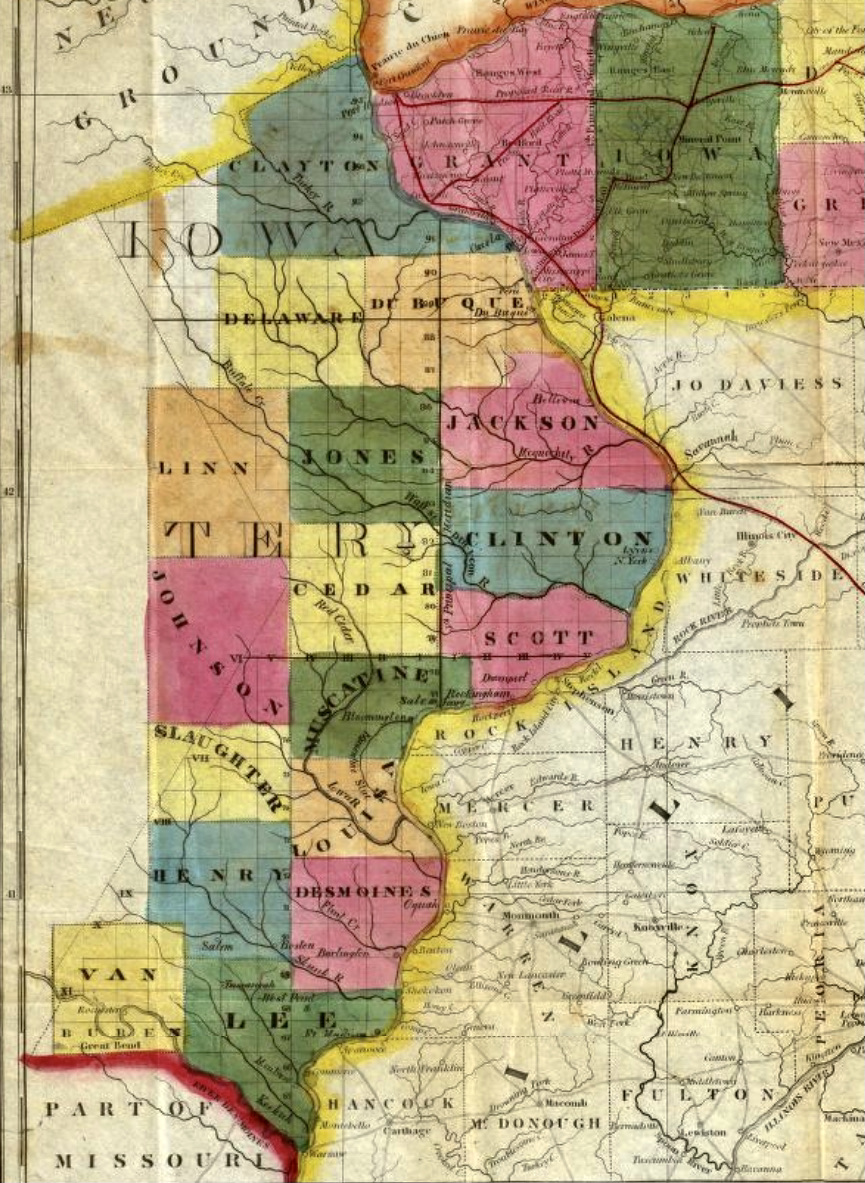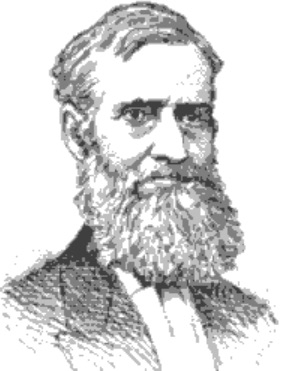




The rare postal cover and letter (below) we want to share with you here comes from the Iowa City desk of Joseph T. Fales – State Auditor, and was written and mailed on October 2, 1850. It’s a personal letter from Fales and his wife – Almira – and is headed to his friend – Judge Charles T. Mason, and his wife – Angelica – in Burlington. Allow me here to give you a brief overview of these two Iowa pioneers before we share the letter and its contents.




Joseph Thomas Fales was born in Pennsylvania around 1807, where he married Rhoda A. Richman, and had four children – Joseph E. (1829), Rachel R. (1831), Mary M. (1833), and Maria L. (1835) – before moving to Iowa, first settling in Linn County about 1836. Once settled here, two more children were born to Joseph & Rhoda – Charles (1839) and Thomas (1842). Records indicate that he helped settle the little village of Ivanhoe – a long-forgotten community in Franklin Township of Linn County.
When Iowa became a U.S. Territory in 1838, the new Governor – Robert Lucas – called for the First Assembly of the Territorial Legislature to meet in Burlington in the fall. Below, is a list of the 26 representatives and one clerk assigned to the Iowa Territorial House of Representatives – meeting from November 12, 1838 until January 25, 1839. As you can see, Joseph T. Fales was appointed as the Chief Clerk – a position he proudly held throughout the first six years of Iowa’s existence – from 1838 to 1844 – with three years in Burlington, followed by another three in Iowa City! Read more about Fales impact on the early Territorial Legislative Sessions.


Records indicate that the Fales family continued to live in Linn County at least through 1845, when sadly, Joseph’s wife, Rhoda – born in New Jersey in 1804 – died suddenly, at age 41, on September 25th. Fales remarried two years later – in September, 1847 – to Almira Lockwood, a young widower with one child: Alex (1832). By the time we get to October 1850 – when Fales wrote his letter to his friend Judge Mason – he is now State Auditor and his family had lived in Iowa City for several years. Below are the family records as recorded in the 1850 U.S. Census…




In 1836, the same year Fales came to Linn County, Charles T. Mason, influenced greatly by Albert Lea‘s book on Iowa, ventured west to explore Wisconsin Territory. Writing in his diary, Mason pondered…
“Something is continually whispering to me that there is a more favorable field for my future exertions, either professional or political.”
At first, he assumed he would follow that whisper to Belmont, Wisconsin, but when Territorial Governor Henry Dodge announced the decision to move the territorial capital south into Iowa (1837), Mason wisely chose to follow suit, relocating to Burlington instead. Apparently, it didn’t take long for Governor Dodge to become impressed with Charles, inviting him to become one of his aides and appointing him the public prosecutor of Des Moines County. Later that same year (August 1, 1837), Mason married Angelica Gear of Pittsfield, Massachusetts, who had come west with her brother and sister to live in Galena, Illinois. Together, the couple had three lovely daughters – Sarah E. (1840), Angelica E. (1842), and Mary J. (1845) – living the remainder of their lives on a farm near Burlington.
On July 4, 1838, when Iowa became a territory, President Martin Van Buren appointed Mason as Chief Justice of the Territorial Supreme Court, where he played a major role in land-mark decisions that truly bolstered the abolitionist movement in Iowa. You can read more about Judge Mason here.



So now, let’s get to that 1850 letter from Joseph T. Fales in Iowa City to Judge Mason in Burlington. As we do with other letters, we’ll give you the original content in bold with a few comments following…



Iowa City – Oct 2, 1850
Hon. Charles Mason
Dear Friend,
Your kind invitation, to partake of peaches and grapes, was duly received and considered by Mrs. Fales and myself: and you will please accept our thanks and allow me to say that, at present, I cannot determine whether it will be in our power to accept the invitation or not.


It’s fall in Iowa – the harvest is in – and, it’s time to invite friends over to the Mason farm to share in the bounty. As we’ve discussed in their biographies, Fales and Mason have most certainly known each other since 1838 – when they first met in Burlington. Over the past twelve years, I’m sure there have been numerous occasions when the two have interacted in governmental settings, but being both strong Democrats, I’m guessing they’ve also attended many political functions together as well. Keep in mind that Mr. & Mrs. Mason have also been friends with Fales when Joseph lost his first wife, Rhoda (1845), and quite possibly attended his wedding to Almira Lockwood two years later (1847).

Mrs. Fales has been very unwell for 5 weeks; unable to go out of the house. Now, she is a little better, and may improve so far that a small journey will be of benefit to her. If such should be the case we will come, but we beg of you, not to make any preparations for us.
After losing his first wife, Rhoda, to sickness at the young age of 41, I’m guessing Joseph Fales has been very cautious in making sure Almira doesn’t over-extend herself, since she has “been very unwell for 5 weeks – unable to go out of the house.”

We shall expect to see you and your family here this winter. Capt. Irish informed me that he was looking for a house for you. I hope you will come. Your duties as Commissioner of Revision, I suppose will require you to be here. I hope to have the pleasure of reading officially the labors of the Commissioners, being a candidate for Secretary of the Senate. I shall try to be elected.
This paragraph points to the new work assignment that had been given to Judge Mason. In January 1848, the state legislature appointed Mason to chair a three-man commission “to draft, revise and prepare a code of laws.” One historian states it this way…


While it appears from Fales’ letter that Judge Mason was considering a move from Burlington to Iowa City in order to complete this massive project, records indicate that he didn’t choose to followup on Captain Frederick Irish‘s offer to find a suitable property. By February of 1951, the project was complete and the bill was passed by both the Senate and the House of Representatives meeting in Iowa City.



The result was The Code of 1851, which was hailed for its clarification and reorganization of existing statutory laws. Among many new provisions added by the commissioners were the creation of county judges, the broadening of laws on incorporation, and the abolition of common law procedure in civil actions, including the removal of the statutory ban on interracial marriages.
And, oh – by the way – State Auditor Joseph T. Fales, try as he might, did not win his election in 1850, losing to Jackson County’s Philip B. Bradley, who became the Secretary of the Iowa Senate until 1852. But, fear not. As you’ll see in a moment, there was another pathway open for Fales and his job future.

Mrs. F. wishes to be kindly remembered to Mrs. M and yourself.
Very Truly yours as – Jos. T. Fales

So, we don’t know if Joseph & Almira Fales made it down to Burlington for that Fall 1850 peaches and grapes gathering at the Mason farm, but we’re guessing that they did have a few more memorable times together with Charles & Angelica before both families moved to Washington D.C.


In March of 1853, President Franklin Pierce (above) appointed Judge Mason to head up the U.S. Commission of Patents in Washington, D.C., where his responsibilities included agriculture and weather information. A farmer himself, Mason promoted agricultural research, collected world statistics on tobacco and cotton, and authorized a system of obtaining national weather information by telegraph. An energetic reformer, Charles reorganized the system of applying for patents and hired the first women in regular employment in a federal office.
Read a bit more about this season in the life of Charles T. Mason.
Records show that one of those new employees that Mason hired for the U.S. Patent Office was his good friend – Joseph T. Fales – who then moved to Washington by the mid 1850’s. And while the good judge returned back home to Burlington in 1857 – see details here – Joseph & Almira Fales remained in D.C., with Fales serving as an examiner for the U.S. Patent Office until retiring in the 1870’s.

According to her obituary (below), Almira L. Newcomb, who died on November 8, 1868 at age 59, became well-known as a compassionate nurse throughout the Civil War years.




Joseph T. Fales died nine years later, on November 29, 1877 and both are buried at Glenwood Cemetery in Washington D.C. The Burlington Hawk-Eye published this interesting piece (below) in 1875, giving us an entertaining look at Fales and his years of service in Iowa…




As for Judge Charles Thomas Mason and his wife, Angelica Gear – you can read more details here – the couple returned to Burlington in 1857, settling in here for the remainder of their lives. Angelica died on March 29, 1873 while Charles passed on February 25, 1882. Both were originally buried in Aspen Grove Cemetery in Burlington, but later were moved by family members to Pompey Hill Cemetery in Pompey, New York.





Two good friends – two co-workers – two family men – two Iowa pioneers. Godspeed!
Kudos to the amazing resources below for the many quotes, photographs, etc. used on this page.
About Ivanhoe and the Wolfe family, Ely History, Iowa
Joseph T. Fales – 1850 U.S. Census, Ancestry.com
Secretaries of the Senate, 1846–2021, Iowa Legislature
Old Times – Joseph T. Fales, The Burlington Hawk-Eye, March 4, 1875, p 3
Rhoda A. Richman Fales, Find-A-Grave
Almira L. Newcomb Fales, Find-A-Grave
Joseph Thomas Fales, Find-A-Grave
Charles Mason, University of Iowa – The Biographical Dictionary of Iowa
Preface to The Code-1924, Code of Iowa 1931, Iowa Legislature, p v
The Code of Iowa – Passed at the Session of the General Assembly Of 1850-1, Iowa Legislature
Angelica Gear Mason, Find-A-Grave
Angelica Gear Mason – Memorial, Find-A-Grave
Charles Thomas Mason, Find-A-Grave
Judge Charles Mason – Memorial, Find-A-Grave
Click here to go on to the next section…
Click here for a complete INDEX of Our Iowa Heritage stories…
